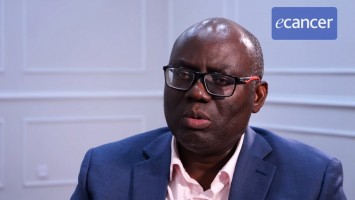I wanted to talk something about the cancer groundshot today because it was the theme of an educational session at this year’s ASCO which I was proud and honoured to chair. This session we had three talks: I talked about lack of access to new cancer drugs in low and middle income countries and can clinical trials be an answer. Then we had a talk from Dr Robin Yabroff from the American Cancer Society about global oncology within high income countries because there are several pockets of populations within high income countries that have very poor access to treatment and the outcomes are very poor. And Dr Miriam Mutebi from Kenya talked about can we use technology to address these disparities. I think it was very fitting with ASCO’s theme of equitable cancer care through innovation and I would strongly encourage all of you to watch this session.
However, what I want to convey today to you all is we need to be more and more cognisant and aware of these issues related to inequity in access to care. It’s going to get all the more wider as these new innovations are coming up, as we are getting newer drugs these are getting more and more expensive. So, if anything, this gap in access to care is going to get more and more wider and patients in low and middle income countries, let’s talk about breast cancer patients – they do not have access to surgery, they do not have access to radiotherapy, they do not have access to proper, correct diagnostics. Any newer drug that we are excited about, that’s like getting excited about the discovery of a black hole – it’s very exciting from a scientific point of view, practically it’s not of any use to us yet. So similarly these newer drugs, it will feel like that for our patients in low and middle income countries because they will not have access to it. So we should all think and work in that direction.
If I have to give an example, the discovery of these new molecules are cancer moonshot initiatives which are important but unless we have a cancer groundshot initiative to ensure that these will reach our patients or, in fact, we ensure that at least our patients will have a correct diagnosis that we can be confident that, yes, they are hormone receptor positive patients, they are HER2 negative patients, they are HER2 positive patients, we even don’t have these facilities across the world.
So talk about precision medicine and how we are going to solve this problem, newer immunotherapies, all these things become just fancy stuff. The purpose of science is to help mankind, science cannot become a fiction or a fairy tale for our patients.








